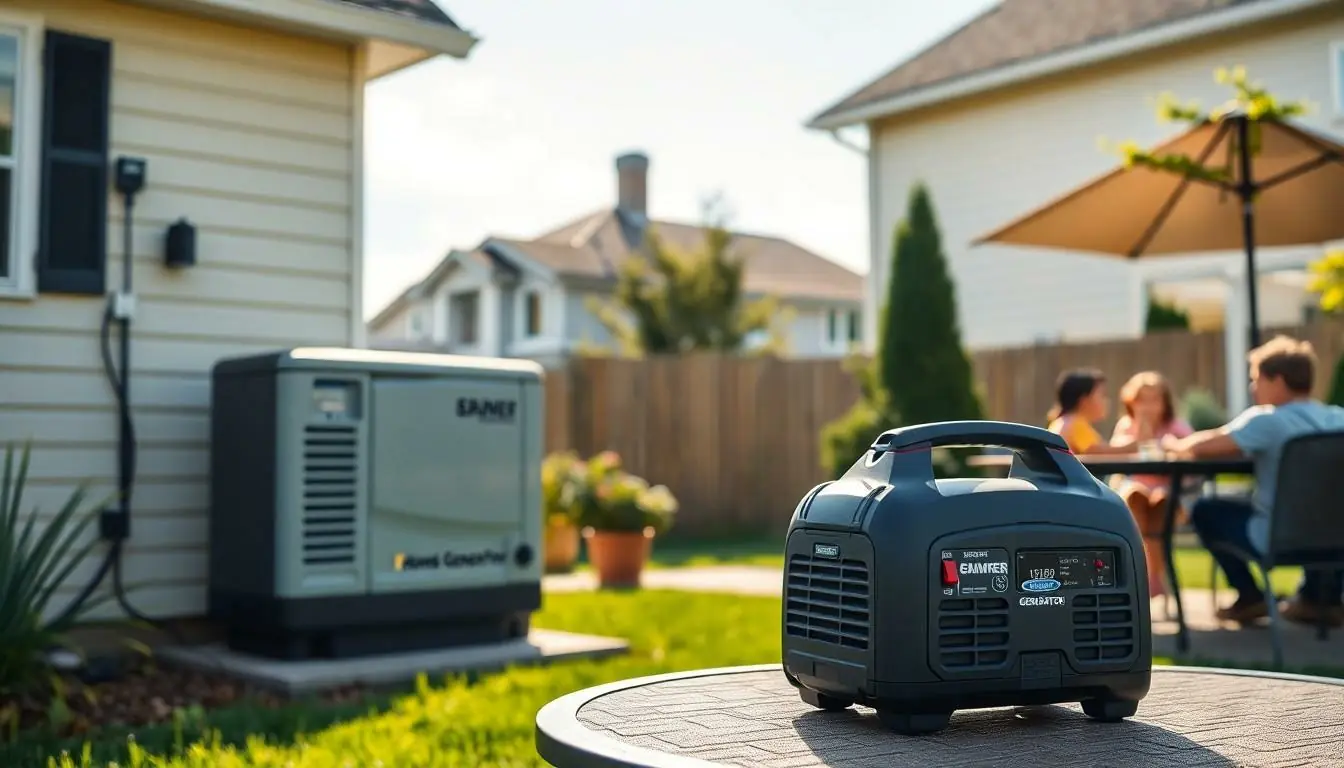When the power goes out and the world outside turns into a dark abyss, a trusty home generator steps in like a superhero. But even superheroes need a little TLC to keep their powers intact. Enter home generator maintenance—the unsung hero of home preparedness that ensures your generator runs smoothly when you need it most.
Table of Contents
ToggleImportance Of Home Generator Maintenance
Regular maintenance of home generators ensures reliability during outages. Scheduled check-ups prevent unexpected failures that could leave households in the dark. Heeding manufacturer recommendations increases the lifespan of the unit, safeguarding the investment made in it.
Inspecting oil levels consistently is vital for optimal performance. Adequate oil prevents engine wear and tear, contributing to smoother operation. Battery health is equally important; maintaining a charged battery ensures quick starts when needed.
Cleaning the air filter helps maintain airflow, enhancing efficiency. Clogged filters force the engine to work harder, leading to increased fuel consumption. In turn, this can escalate operational costs and reduce effectiveness.
Furthermore, exercising the generator monthly helps ensure readiness. Running the unit under load for 30 minutes can uncover potential issues before they become serious problems. If any irregular sounds or vibrations occur, addressing them immediately can prevent larger issues down the line.
Failure to perform maintenance can result in costly repairs. Those expenses often exceed the cost of regular servicing, emphasizing the need for proactive care. Prioritizing maintenance extends beyond performance; it also adds a layer of safety, reducing risks associated with fuel leaks or electrical malfunctions.
Given its vital role, treating the home generator with respect and regular care pays off immensely. An efficiently maintained generator not only provides peace of mind but also guarantees power when it matters most. Organizations like the American Society of Home Inspectors provide guidelines for best practices in generator maintenance, ensuring homeowners stay informed.
Types Of Home Generators

Various types of home generators exist, each designed for specific needs and scenarios. Understanding these options helps homeowners make informed decisions.
Standby Generators
Standby generators automatically activate during power outages. They connect directly to the home’s electrical system and run on natural gas or propane. These units provide seamless backup power, engaging within seconds of an outage. Regular maintenance ensures their optimal performance and longevity. Standby generators can power entire houses or select circuits. Homeowners often choose this type for its convenience and reliability.
Portable Generators
Portable generators offer versatility and flexibility for homeowners. They typically operate on gasoline and can power essential appliances during outages or outdoor activities. Mobility is a key feature; users can transport them easily to different locations. Regularly checking oil levels and fuel ensures efficient operation. Power output can range from 1,000 to over 10,000 watts, accommodating diverse needs. Ideal for camping or emergency situations, portable generators provide essential support when required.
Regular Maintenance Tasks
Home generator maintenance involves specific tasks that ensure reliability and efficiency. Regular attention to these areas promotes longevity.
Oil Changes
Oil changes play a critical role in generator maintenance. Checking oil levels monthly protects the engine from wear and tear. During the oil change, replace old oil with fresh oil according to the manufacturer’s recommendations. Clean or replace the oil filter as needed to enhance performance. Performing this task every 50 to 100 hours of operation maximizes engine efficiency. If the generator runs in dusty conditions, more frequent oil changes may be necessary.
Air Filter Replacement
Replacing the air filter ensures optimal airflow and combustion. A clean air filter improves efficiency, fuel economy, and overall operation. Inspect the air filter every month and replace it as per the manufacturer’s guidelines or when dirt accumulation is visible. Generators operating in environments with high dust levels require more frequent checks. This simple preventative measure can lead to significant savings on operational costs while increasing the unit’s lifespan.
Battery Checks
Battery checks ensure quick starts and reliable performance. Monthly inspections of battery terminals for corrosion help maintain proper connections. Keeping the battery charged is essential for standby generators, especially during long periods of inactivity. Use a multimeter to check voltage levels; any reading below 12.4 volts indicates that charging may be necessary. Regularly cleaning battery terminals and ensuring a tight fit enhances efficiency and prevents operational issues.
Seasonal Maintenance Tips
Regular maintenance throughout the seasons keeps a home generator operating efficiently. Homeowners benefit from focusing on specific tasks during both pre-season and post-season periods to ensure reliability.
Pre-Season Preparations
Checking generator oil levels sets the stage for optimal performance. Change the oil if it’s dirty or low. Examine the fuel system for leaks or corrosion. Clean air filters to maintain airflow and enhance combustion. Testing the battery ensures that it can handle demands when called into action. Run the generator monthly under load to identify any potential issues. Following these steps prepares the generator for upcoming power needs during peak seasons.
Post-Season Shutdown
After a season of use, shutting down the generator requires attention to detail. Start by draining any remaining fuel to prevent degradation and contamination. Clean the exterior to protect against rust and debris buildup. Inspect all components for wear and replace any damaged parts. Store the generator in a dry, protected area, ensuring it’s ready for the next season. Maintain a record of inspections and servicing to track performance and identify trends. These actions guarantee the generator remains reliable and efficient for future use.
Troubleshooting Common Issues
Generators may present various common issues that require attention. Recognizing these problems early can prevent costly repairs.
- Generator Won’t Start: A lack of fuel or a dead battery often causes this problem. Checking fuel levels and examining the battery’s charge can resolve starting issues quickly.
- Oil Leaks: Detecting oil leaks can indicate worn seals or gaskets. Inspecting the generator regularly for signs of oil buildup helps ensure timely repairs before further damage occurs.
- Low Power Output: Insufficient power during operation can stem from a dirty air filter or an overloaded generator. Cleaning or replacing the air filter often restores normal functionality.
- Overheating: Generators can overheat due to blocked vents or low oil levels. Cleaning the vents and ensuring proper oil levels prevent overheating and prolong service life.
- Unusual Noises: Odd noises may signal a mechanical issue. Listening for strange sounds during operation prompts immediate inspection to identify potential problems.
- Electrical Issues: Flickering lights or tripped breakers indicate electrical problems. Verifying connections and ensuring the generator is not overloaded can usually rectify these issues.
- Battery Challenges: Battery-related problems might prevent starting. Regular assessment of the battery’s charge and terminals contributes to reliable performance.
- Fuel System Problems: Fuel leaks or stale fuel can hinder operation. Addressing leaks immediately and replacing old fuel maintains generator efficiency.
Staying proactive with generator maintenance and addressing these common issues can ensure optimal performance and longevity. Following manufacturer guidelines and consulting professionals when necessary supports smooth operation and reliable service during power outages.
Home generator maintenance is essential for ensuring reliable power during outages. By committing to regular upkeep and following manufacturer guidelines, homeowners can protect their investment and avoid costly repairs.
Performing key tasks like oil changes, battery checks, and air filter cleanings not only enhances efficiency but also extends the generator’s lifespan. Seasonal preparations and proper storage after use are crucial steps that shouldn’t be overlooked.
Staying proactive about maintenance and addressing potential issues early can prevent unexpected failures. Ultimately, a well-maintained generator provides peace of mind and ensures that power is always available when it’s needed most.


